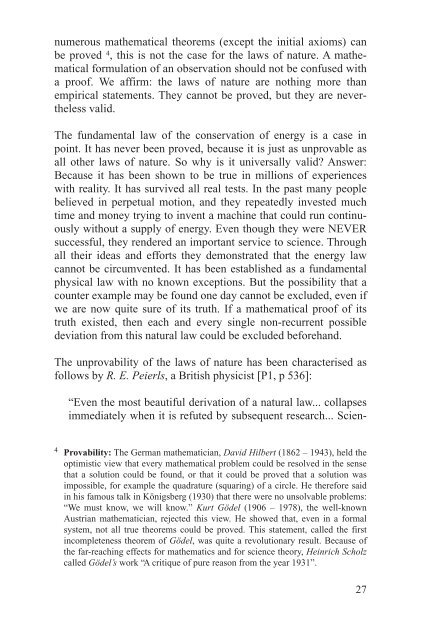In the Beginning was Information
6KezkB
6KezkB
- No tags were found...
Create successful ePaper yourself
Turn your PDF publications into a flip-book with our unique Google optimized e-Paper software.
numerous ma<strong>the</strong>matical <strong>the</strong>orems (except <strong>the</strong> initial axioms) canbe proved 4 , this is not <strong>the</strong> case for <strong>the</strong> laws of nature. A ma<strong>the</strong>maticalformulation of an observation should not be confused witha proof. We affirm: <strong>the</strong> laws of nature are nothing more thanempirical statements. They cannot be proved, but <strong>the</strong>y are never<strong>the</strong>lessvalid.The fundamental law of <strong>the</strong> conservation of energy is a case inpoint. It has never been proved, because it is just as unprovable asall o<strong>the</strong>r laws of nature. So why is it universally valid? Answer:Because it has been shown to be true in millions of experienceswith reality. It has survived all real tests. <strong>In</strong> <strong>the</strong> past many peoplebelieved in perpetual motion, and <strong>the</strong>y repeatedly invested muchtime and money trying to invent a machine that could run continuouslywithout a supply of energy. Even though <strong>the</strong>y were NEVERsuccessful, <strong>the</strong>y rendered an important service to science. Throughall <strong>the</strong>ir ideas and efforts <strong>the</strong>y demonstrated that <strong>the</strong> energy lawcannot be circumvented. It has been established as a fundamentalphysical law with no known exceptions. But <strong>the</strong> possibility that acounter example may be found one day cannot be excluded, even ifwe are now quite sure of its truth. If a ma<strong>the</strong>matical proof of itstruth existed, <strong>the</strong>n each and every single non-recurrent possibledeviation from this natural law could be excluded beforehand.The unprovability of <strong>the</strong> laws of nature has been characterised asfollows by R. E. Peierls, a British physicist [P1, p 536]:“Even <strong>the</strong> most beautiful derivation of a natural law... collapsesimmediately when it is refuted by subsequent research... Scien-4 Provability: The German ma<strong>the</strong>matician, David Hilbert (1862 – 1943), held <strong>the</strong>optimistic view that every ma<strong>the</strong>matical problem could be resolved in <strong>the</strong> sensethat a solution could be found, or that it could be proved that a solution <strong>was</strong>impossible, for example <strong>the</strong> quadrature (squaring) of a circle. He <strong>the</strong>refore saidin his famous talk in Königsberg (1930) that <strong>the</strong>re were no unsolvable problems:“We must know, we will know.” Kurt Gödel (1906 – 1978), <strong>the</strong> well-knownAustrian ma<strong>the</strong>matician, rejected this view. He showed that, even in a formalsystem, not all true <strong>the</strong>orems could be proved. This statement, called <strong>the</strong> firstincompleteness <strong>the</strong>orem of Gödel, <strong>was</strong> quite a revolutionary result. Because of<strong>the</strong> far-reaching effects for ma<strong>the</strong>matics and for science <strong>the</strong>ory, Heinrich Scholzcalled Gödel’s work “A critique of pure reason from <strong>the</strong> year 1931”.27











![[Pham_Sherisse]_Frommer's_Southeast_Asia(Book4You)](https://img.yumpu.com/38206466/1/166x260/pham-sherisse-frommers-southeast-asiabook4you.jpg?quality=85)




